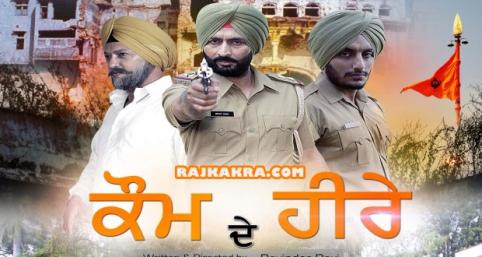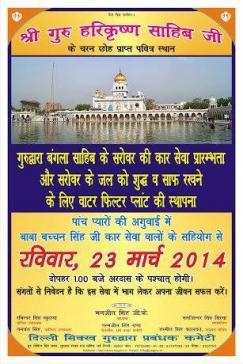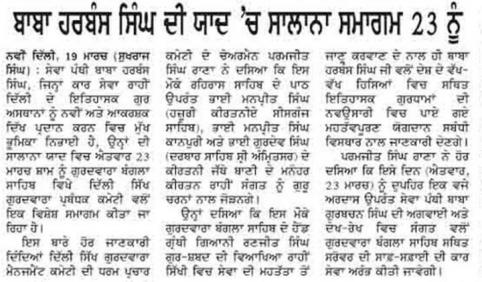Leaderboard
Popular Content
Showing content with the highest reputation on 03/23/2014 in all areas
-
4 points
-
This is the upside down topsy turvy world which is India. Getting 'backward class' status is like winning the lottery. Get it, and your son and daughter is guaranteed a job. Get it, and your son and daughter is guaranteed a university place. Get it, and your son and daughter only needs to attain a lower grade in order to get a pass in exams. Without it, the status quo was that unemployment among jatts, including their graduates, was close to 90%. The urban classes who own the private businesses in Punjab don't give jobs to the jatts because they only give jobs among their own groups and the government civil service jobs were reserved for the backward classes. That, and that only, is why many jatts were agitating to get the 'status'. When you live in a corrupt, backward system, the only way to function is in corrupt backward ways.4 points
-
WJKK WJKF, Jat, jat, jat! That's all we ever hear. This is a political and economical/social topic not concerning sikhi or the parchar of sikhi. Simply the ever growing supremacy issue for the jatt. Nothing to do with our dharam. How the hypocrite has been bitten back by hypocrisy. Leave your caste aside, then become khalsa, one united people of no caste. What would India do then?3 points
-
WJKK WJKF Just watched the movie today and it was amazing. So much history was added that a lot of people were unaware about. Only thing I didn't like was the fact the theatre barely had any people (Brampton Silvercity). So please take the time out to support the people who put in so much effort instead of just downloading it. WJKK WJKF2 points
-
Lathrop, CA, USA (November 17, 2013): Bhajan Singh Bhinder, Founding Director of Sikh Information Centre, issued the following statement about Punjab: A History from Aurangzeb to Mountbatten (2013), a new book by Rajmohan Gandhi: “Rajmohan Gandhi Perpetuates Propaganda in Grandfather’s Footsteps” Rajmohan Gandhi In his purported history of the Punjab, Mohandas Gandhi’s grandson, Rajmohan Gandhi, has invented history in much the same way as his grandfather used to imaginatively retell facts. In the book, Rajmohan libels an Indian cultural treasure, Guru Gobind Singh Ji, by describing him as a mansabdar (a mercenary, essentially) for Mughal Emperor Bahadur Shah during his occupation of India, a fabricated detail which has never before been included in any biographical sketch of the guru. At a time when an iron-fisted conqueror ruled India from Delhi, Guru Gobind Singh empowered the common man to be a sovereign individual. When he founded the order of “Khalsa,” meaning “Pure” or “Sovereign,” he launched a life philosophy which intends each man as a king who alone rules himself and who rules himself alone. When he founded the Khalsa in 1699, Guru Gobind initiated the first five people who voluntarily offered their lives in service of truth. He christened them each a “Singh” so they would share the same name of nobility to erase social divisions. After this baptism, Guru Gobind bowed before the five and asked them to initiate him also as a Singh. Then Guru Gobind Singh taught a doctrine of universal human equality in the eyes of one true God. Man, he taught, is subservient to God, and to God alone belongs the victory — “Waheguru ji ka Khalsa, Waheguru ji Ki Fateh” (Khalsa belongs to God; victory belongs to God). He condemned rituals as hollow; instead, he taught a life of self-sacrifice and respect for other human creatures as the best way to worship God. He particularly emphasized honorable treatment of women as of equal value to men, remarking: From now on, you have become casteless. No ritual, either Hindu or Muslim, will you perform nor will you believe in superstition of any kind, but only in one God who is the master and protector of all, the only creator and destroyer. In your new order, the lowest will rank with the highest and each will be to the other a brother. No pilgrimages for you any more, nor austerities but the pure life of the household, which you should be ready to sacrifice at the call of Dharma. Women shall be equal of men in every way. No veil for them anymore, nor the burning alive of a widow on the pyre of her spouse. He who kills his daughter, the Khalsa shall not deal with him. After he founded the Khalsa in 1699, he faced down the heaviest of odds to preserve the spark of liberty in South Asia by resisting the oppression of invading Muslim hordes. For years, he defended against the control of Mughal Emperor Aurangzeb before finally making peace with his son, Bahadur Shah, who then betrayed the peace agreement by sending assassins against Guru Gobind Singh. Perverting history by interpreting the Guru’s dissent against oppression as hiring his sword to a tyrant is outlandish and insults a man who gave his life to liberate others. Rajmohan Gandhi’s baseless assertions are best understood in context of the ancient historical conflict between the two dominant ideologies of India — of the Moolnivasi, or indigenous people, and of the Aryans, who invaded India from the northwest. Aryanism crafted the caste system and its foundational texts like Manusmriti (The Laws of Manu) to institutionalize the rule of a few over the many. This self-perpetuating system of social tyranny is kept in place by the ignorant cooperation with their subjugation of the approximately 85% of India’s population who constitute Moolnivasi, many of whom have never been educated about the evils of the caste system or of their right not to cooperate with it. Gandhism’s chief contribution to this system has been to further manipulate people into seeing evil as good. Gandhi hid himself in broad daylight by painting his public image as messianic. Meanwhile, the devilish truth behind the smoke and mirrors was Gandhi’s life, from his early days as an attorney in South Africa to his death in his 70s, involved promoting racial segregation and social division, enthusiastic participating in aggressive colonial warfare, sexually molesting his teenage relatives, and playing political games that resulted in India’s partition and the deaths of millions. As a scholar and even a biographer of his grandfather, Rajmohan has failed to bring these facts to light, which is hardly surprising considering the Gandhi family’s denigration of Guru Gobind Singh, as well as of Sikh traditions, is an old habit. In 1925, Mohandas called the guru a “misguided patriot.” [1] On another occasion, he declared: “So far as the Sikh kitchen is concerned, it is a menace.” [2] It is decades past time the Gandhi family ended its tired tirade against the Moolnivasi people of India and their emancipatory heroes. India remains a land of oppression in need of defenders. For instance, we now see Narendra Modi, CM of Gandhi’s home-state of Gujarat and orchestrator of the 2002 Gujarat Genocide in which thousands of Muslims were massacred, poised to become Prime Minister. While the world still sees Mohandas Gandhi as a virtual deity, he is worshipped in India, his picture is on the wall of every government office in India and even in the U.S. President’s office, and his philosophy is being taught even to primary school children, the sad reality is the fruits of his legacy are visible in an India where architects of genocide presently reign. Although Gandhi boasted about spending his life “experimenting with truth” instead of simply searching for it, at least one statement of his was true: “An error does not become truth by reason of multiplied propagation, nor does truth become error because nobody sees it.” Indeed, no matter how frequently or for how long the Gandhi family propagates errors, their lies will never become the truth. The truth is that the Gandhi family has served as chief apologists for the Indian State since before its founding in 1947. Propagandists like Gandhi, often cloaked as religious icons, are invaluable to tyrannies, as explained by political theorist Murray Rothbard: Throughout history, as we shall see further below, despots and ruling elites of States have had far more need of the services of intellectuals than have peaceful citizens in a free society. For States have always needed opinion-moulding intellectuals to con the public into believing that its rule is wise, good, and inevitable; into believing that the “emperor has clothes. Until the modern world, such intellectuals were inevitably churchmen (or witch doctors), the guardians of religion. It was a cozy alliance, this age-old partnership between Church and State; the Church informed its deluded charges that the king ruled by divine command and therefore must be obeyed; in return, the king funneled numerous tax revenues into the coffers of the Church. [3] Instead of speaking out to demand justice for the innocent and prevent oppressors from terrorizing the land, Rajmohan Gandhi is publishing a book with false facts which injure the sterling reputation of one of India’s greatest defenders, Guru Gobind Singh Ji. Like his grandfather before him, Rajmohan appears to be demonizing a pioneer of liberty to cloak his own support for the social division of caste. Rather than addressing real and pressing social issues which daily result in discrimination and even death, the Gandhi family has spent the past century spreading an ambiguous philosophy which openly enshrines the caste system as a supposed social good. This was obvious in 1933, when Mohandas Gandhi declared: “The caste system, in my opinion, has a scientific basis. Reason does not revolt against it. It has disadvantages. Caste creates a social and moral restraint — I can find no reason for their abolition. To abolish caste is to demolish Hinduism. There is nothing to fight against the Varnasharma. I don’t believe the caste system to be an odious and vicious dogma.” [4] This was preceded in 1920 by Gandhi’s attempt to turn logic on its head in arguing that caste (a system which is by its very definition founded on inequality because it breaks society into four increasingly-degraded categories) does not create inequality. He stated: “I am certainly against any attempt at destroying the fundamental divisions. The caste system is not based on inequality.” [5] Logically, of course, as well as morally, social division is irreconcilable with social equality. As a contrast in philosophies, Guru Gobind Singh Ji declared centuries before Gandhi: “All human beings are the reflection of one and the same Lord. Recognise ye the whole human race as one.” The absence of this attitude in Gandhism, as illustrated both in Gandhi’s philosophizing and his personal relations, is leading to its intense critical analysis. George Orwell said: “He who controls the present, controls the past.” Reclaiming the truth of history and preserving it for perpetuity is the most important task an intellectual may undertake. Theirs is a greater responsibility, though, for they are tasked with telling truth. Anything less than the truth is a lie, and lies are useful only for propaganda. Experimenting with the truth produces the results we see in India today, which is why the Hollywood Gandhi remains so useful to the Indian State as propaganda. The truth is that the Indian State spots the globe with Gandhi statues as a deliberate propaganda strategy. On November 10, 2010, Indian MP Magunta Sreenivasulu Reddy placed a formal question to India’s Ministry of External Affairs: “Does the Indian state assist in placing statues of Gandhi around the world?” Their response: “Yes.” The state bureaucracy in charge of this is the Indian Council for Cultural Relations, which placed 65 state-funded statues and busts of Gandhi around the world between 2001 and 2010. As Rajmohan Gandhi continues to spread the myth of his grandfather while fabricating lies about Guru Gobind Singh Ji, intellectuals like women’s rights activist Nannette Ricaforte are awakening to the truth of Gandhi’s history and recognizing just how many people were harmed by his legacy. In October 2013, Ricaforte wrote: Spiritual leaders like Gandhi procure a mass following whose reverence for him blinded them to the truth. He was a sexual predator while he espoused non-violence in fighting for the independence of India. Yet his ideology was enough for the majority of his supporters to disregard his immoral acts. In my work as an abolitionist, fighting for the rights of sexually exploited victims, I can’t minimize the facts I’ve learned about Gandhi. It’s unsettling, to say the least. I’ve met young victims of human trafficking, child labor, and the sex trade, stripped of their dignity by men in positions of power. Their degradation meant nothing, marginalized because the community revered the perpetrators. There are no words to express the depth of rage and helplessness I’ve felt when confronted with these reactions. [6] South Asian women’s rights activist Rita Banerji, founder of the 50 Million Missing Campaign to expose female foeticide and infanticide, drew similar conclusions in another October 2013 article about Gandhi’s “dark side,” where she wrote: Compared to our reactions and responses today, the people in Gandhi’s time seemed to be far more progressive! They not only recognized that he was abusing his position and power in a way that was unethical and depraved, but they outright condemned it, confronted it, and eventually forced him to stop! On 16th March, 1947, Nirmal Kumar Bose, one of Gandhi’s closest associates wrote a letter to Kishorlal G. Mashruwala, another of Gandhi’s close colleagues, saying, “When I first learnt about Gandhi’s experiment in which a girl took off her clothes and lay under the same cover with him and he tried to find out if any sexual feeling was evoked in him or his companion, I felt genuinely surprised. Personally, I would not tempt myself like that and more than that, my respect for [women] would prevent me from treating her as an instrument in my experiment…” [7] Rajmohan Gandhi, who has made his career on the coattails of his grandfather’s fame, seems blinded to the truth. His 2007 biography, Mohandas: A True Story of a Man, His People and an Empire, is nothing but a stale, melodramatic retread of the typical Gandhi myth — Mohandas as a messianic figure who not only led the country to independence but the people to enlightenment. Objective modern biographers are telling a completely different story, as I mentioned earlier: Gandhi was racist, sexist, and casteist. Unlike what history has shown us in the Sikh tradition, where individuals are liberated and mass emancipation is taught as the key to social progress, Gandhism preaches evil cloaked as good — war as peace, hate as love, segregation as unity, subjugation as equality, and tyranny as liberty. Guru Gobind Singh sacrificed his family, his wealth, and eventually his life to free India, and Rajmohan Gandhi’s decision to build on the false legacy of his grandfather by besmirching one who sacrificed himself for others is truly disgraceful. Real heroes of human unity like Dr. Bhim Rao Ambedkar, who began studies at Columba University in the United States of America in 1913, worked to erase caste barriers through the simple act of encouraging people from separate castes to eat together, drink together, marry one another, and in spirit to recognize the same universal human equality and casteless society taught by Guru Gobind Singh Ji. It has been said the victors write the history books. Brahmins, the ruling elite of India, never stopped being the victors because the system of social division established by caste has placed them at the top of the ivory tower for eons. Brahmanism has no interest in transmitting true history detailing the heroics of Guru Gobind Singh Ji or those, like Dr. Ambedkar, who worked peacefully for real social uplift. No doubt Dr. Ambedkar receives no hearing from the ruling elite because he took the risk of warning the world that Gandhism was just a cynical political ploy for control: I am sure many have felt that if there was any class which deserved to be given special political rights in order to protect itself against the tyranny of the majority under the Swaraj constitution it was the depressed classes. Here is a class which is undoubtedly not in a position to sustain itself in the struggle for existence. The religion to which they are tied, instead of providing for them an honourable place, brands them as lepers, not fit for ordinary intercourse. Economically, it is a class entirely dependent upon the high-caste Hindus for earning its daily bread with no independent way of living open to it…. There have been many Mahatmas in India whose sole object was to remove Untouchability and to elevate and absorb the depressed classes, but everyone has failed in their mission. Mahatmas have come, Mahatmas have gone but the Untouchables have remained as Untouchables. [8] As for Gandhi’s use of untouchability as a political issue, Dr. Ambedkar stated in 1955: All this talk about Untouchability was just for the purpose of making the Untouchables drawn into the Congress. That was one thing. Secondly, he wanted to make sure that Untouchables would not oppose his movement of Swaraj. I don’t think beyond that he had any real motive of uplift. He wasn’t like Garrison in the United States, who fought for the Negroes. [9] We must be cautious. Whatever history we have is being systematically chipped away, stripped away, and twisted into lies accepted as truth. Rajmohan Gandhi is but the latest member of his family to play a part in this assault on truth. India’s history, therefore, proves the tragic tale of the sufferings of many minorities at the hands of powerful proponents of falsehood. Rajmohan’s work continues to spread lies. If he is to find redemption, we insist he begin by penning a letter of apology to the world regarding his grandfather’s behavior towards women, blacks, Sikhs, Dalits, and the many others he victimized and subjugated. Rajmohan ought to surrender himself in servitude to the downtrodden of India to atone for the damages caused by his family to the people of South Asia. Finally, we appeal to universities and booksellers to ignore Rajmohan Gandhi’s book, Punjab, especially as long as he refuses to speak the truth about his family deliberately hidden dark secrets. The world no longer has any excuse to remain gullible about Gandhi’s past in the face of so much information exposing his exploitation of the vulnerable. The myth is Gandhi as savior but the truth is Gandhi as predator and so, it seems, Gandhism must be rejected completely.2 points
-
both are naam. seperating them and saying that they are different is not the thing to do. however, if you ask "which one" in ur question, then u can say waheguru is meditative for a mind that is focused on maharaj, and that mool mantar (nanak hosi pi such) is for getting your mind onto maharaj. i suppose you can say that the moolmantar defines what guru is. it is the mool of god. rub da mool. and in the sense of, meditating on god. so, sure we can say waheguru waheguru, but what are we focusing on? its fair well and good sying waheguru is god, but the question of, what does "waheguru is god" mean, (you could say) is answered by moolmantar. then, once you realise a mool of god, you can say vaha vaha to that definition of guru. lastly, "sahib, mera neet nava.." however much you meditate, that is how new god will look like to you. and that is truly amazing. hence, vaha guru. waheguru. dhan guru.2 points
-
Benti in the charan of Admin. Could this post be pinned. Many thanks. Vairag Shatak Raja Bharthari lived in Ujjain Nagar around two and a half thousand years ago. He was born in a high kul {lineage} who was a vidhwan pandit {scholar}. He was fair and just towards all his subjects and as such was much loved by all the parja {citizens}. His father’s name has been recorded in Rajavali as Raja Gandarbh Sann but mother’s name has been omitted and it is written that he was in fact born to a dasi {servant girl}. The raja had been married three or four times already but when he heard the kirti {praises} of a mahan sundar rajkumari {very beautiful princess}, he married her too. The name of this rani was Pingla. Her magical beauty and gunn {attributes} captivated the raja in such a way that he became her gulam {slave}. Just as the commands of Noor Jahan had a hold over Badshah Shah Jahan , this was the same scenario with raja Bharthari. Pingla feared none since the king Bharthari was under her “spell”. She wandered around sutantar {independently}, without fear, and as such fell in love with the astbal droga {stable master}. The rani had a devarr {husband’s younger brother}, who considered his elder brother raja Bharthari as a father figure and the rani as a mother. He obeyed their every order with utmost loyalty. The maharajah had given him the post of Pardan Mantri {Prime Minister}, the duties of which he carried out with great splendour. His name was Veer Vikramaditya, he is the same Mahapursh {great soul} who later came to be known as the famous Maharajah Bikramjit. The samat calendar is still used in his memory even today. Vikramditya was the first to have suspicions regarding the vibchar {adultery} of rani Pingla. After much deliberation he finally informed his brother raja of the misdeeds of rani Pingla. The raja was so besotted with Pingla that he took offence and as such reprimanded his own brother for saying such a thing. The raja went as far as to say that it is because you are my younger brother that I shall remain quiet otherwise I would have had you hanged. The raja considered his rani to be the supreme satti savitri {a lady who was the epitome of high moral character}. When Pingla found out about this confrontation she began to show even more love towards the raja. After some days she made a request to the raja, “your younger brother Vikramjit is like a son to me and I have always tried to be a mother to him but he looks at me in a lustful manner. Any other female would have succumbed to his advances by now! It is me who has evaded this terrible situation. He has made every attempt to defile me, and not only me, he has in fact destroyed the satt dharam {purity} of many women in this kingdom. It was only a few days ago that he attempted to lure the noh {daughter-in-law} of the Brahmin with the assistance of dootia {maids etc.} but she like me too is a pattibratta {faithful woman} and as such resisted his intentions. I implore you to stay alert and be very wary about such an adharmi {unscrupulous} man. I do not want you to be in any danger from him.” Upon hearing this the Maharajah took every word to be the utmost truth. Then rani Pingla called the Brahmin and said “are you aware that the Maharajah is is in my total control and if you desire your well being then follow my instructions to the full. Go to the Maharajah and make a pukar {plea}, if you don’t then I shall have you tortured!” The Brahmin knew that the raja was totally smitten by Pingla and as such would only take her word against any other. “I will obey your every command” replied the Brahmin to rani Pingla. Pingla told the Brahmin ”go to the raja’s court and make a faryad {plea}! and when he asks you what is the matter, you reply that kumar{prince} Bikramjit wants to engage in immorality with my noh {daughter-in-law} and if you are prepared to allow this than I shall leave your nagar {kingdom} and go elsewhere. I cannot stand by and allow my izatt {respect} and istri dharam {chaste} to be destroyed in this way.” “Also remember that you must not succumb to the raja in any way!” Upon hearing this the Brahmin went to see the Maharajah the very next day and cried his dilemma {which the rani taught him} with immense reality. The Maharajah filled with krodh {anger} upon hearing his words. Without padtal {investigation} the maharajah immediately ordered the des nikala {expulsion} of his younger brother from his kingdom. Bikramjit accepted his maharajah brother’s edict with love, patience, and without complain. He immediately went home and gathered his family and promptly left the kingdom. At the same time another situation occurred. One day a Brahmin arrived in the raj darbar {king’s court} and began to tell the raja that “twenty five years earlier I made a dridh sankulp {strict devotion} to do tapp {endurance} in order to appease the Devta {deity}, the devta gave me an Amar Phall {fruit that gives eternal life}. I have come here with that phall, my wife won’t eat it herself nor will she let me eat it. She says that we are poor and persistent poverty will be harder to manage. We only desire death now so that we may escape our hardships. If we eat the amar phall then we shan’t die and as a result will have to endure more hardship. That is why it is my wish that you take the amar phall so that you can continue to rule your kingdom in the most benevolent way and in return you can give us wealth which will eradicate our suffering.” Upon hearing this from the Pandit Rajah Bharthari he took the amar phall in exchange for an abundance of wealth, which pleased the Brahmin immensely. The rajah didn’t eat this fruit himself but gave it to his beloved rani Pingla. The rani thought that it would be deceitful of her to eat the fruit, so when the rajah left she summoned her lover and promptly gave him the fruit. The lover did not eat the fruit either but gave it instead to his favourite prostitute. The prostitute accepted the fruit but began to contemplate her lifestyle “I have sinned all my life, destroyed many marriages etc. If I eat this fruit and become amar {eternal} then this is all I will endure {lustful activities}. It is better that I give this fruit to the Maharajah instead, in whose raj he has given me so many pleasures.” After contemplating this with all sincerity she presented the fruit to the Maharajah. The maharajah was first stunned upon seeing the fruit but then asked the vesvah {lady of the night} where she had obtained this fruit from? Upon being interrogated by Bharthari the veshvah told the whole story truthfully “Your astbal droga {stable master} is my mitr {lover}, he gave it to me.” The raja immediately summoned the droga {stable master} and asked how he became in possession of the fruit? The drogra fell at the rajah’s feet and narrated the whole scenario of how he engaged in immorality with his rani Pingla. As soon as the Maharajah heard the whole story, he immediately filled with nafarat {hatred} of the rani and the world in general. He became fully vairag {total renunciation}. He immediately summoned the maha mantri {prime minister} and said; “look after this raj {kingdom} I am leaving. Bikramjit suffered pains owing to my decision to expel him. Call him back and place him on the throne.” As soon as he had given these instructions he immediately removed the robes that adorned his body. He covered his body with a solitary sheet as he left to join Gorakh. Maharajh Bharthari first wrote “Shingar Shatak” and during his reign wrote “Neeti Shatak” and after attaining vairag {renunciation} he wrote “Vairag Shatak” in which he describes the state of his mind. “Vairag Shatak” Granth was written in Brijj language by the great scholar Kavi Pandit Har Dyal Ji of Choonia Nagar. The Punjabi translation has been undertaken by Pandit Naryan Singh Gyani.1 point
-
1 point
-
o ok, sorry, yes, it does sound very ambiguous. basically, this does happen to people. (i.e. missing lines where they should have said bani). but, on a subconscious level, when you are "in the zone" so to speak, words carry less significance, and feelings take over. so, it could have been you were in a trance state. that means, when you say the bani, you basically said it in your heart, but your mind heard it as if you said it out loud. thats a good thing. now obviously, you can skip bani if you are not paying attention, or if you are doing other things, falling asleep etc. and basically, not concentrating on bani. but, its also possible that you were in the zone, said it with your heart, and skipped saying the line because of it. best thing is, if you think you've skipped it, go back to the previous pauri, and start again. we cant miss bani out. we cant change bani. so... yh.. hope this is clear now just read and concentrate on bani. we need to be doing paat from maharaj tabiya. so we gotta get rid of our mistakes. and recite shudh (correct) bani. gurfateh1 point
-
Whatever you drawn too(listen to inner voice its also called intutative inner divine guidance its aspect of what gurbani calls it sakhi - witness- pure real self-atma), just do it..both gurmantar and mool mantra point towards bhramgyan - absolute reality ..idea is to die in the shabad dhian and gian-gurmantar or mool mantra and let shabad and its gyan take care of everything/rest in natural spontaneous flow without any super imposed- egoic/mind tendencies and pre-conditioning from seeker...!!!1 point
-
maharaj says, "kis nu vahe sunaeeyae" who are you saying waheguru to? we must understand guru to some definition, which does seem like an impossible task, then recite waheguru. this is only the first so called step of it all. naam evolves. its as if, first maharaj says, this is naam. then you will go on an inner journey. and naam goes with you on that journey. so the first so called meditative state, is recitation. then you can see how this evolves. waking sleep states etc and all this jazz that the books say and make millions off, are all kinda correct, but the act of describing it, takes something away from the experience (obviously). naam then turns into nothing. then sunn avastha comes. just to add, all these avasthaz and stuff are crude segregations to explain a continuing process of naam evolving inside you. its hard to describe feelings. and feelings are effectively just chemicals in the body. since iv mentioned sunn avastha, all sunn avastha means is, you feel you are in voidspace. . so, its just you there on your journey. you get to see all the planets and such things. knowledge (which comes at low level naam simran - its not hard to get all knowledge). feelings of beauty, feelings of power etc. really, anything you can want or think of. but the key is, putting all that energy back into naam. then you have more fuel to burn for urself on the journey. "tan mun kaat, kaat sub arpi, vich agni (...) jalaae". you have given all to god. then god gives you more, to which you giv back to god and keep saying, i want only god. rub da mool. waheguru.. but anyway. this is how the journey of naam goes. fateh1 point
-
SriGuruGranthSahib Maharajh is full of Bairaag; Gurbaani emphasises the need for detachment, whilst remaining a part of society. The Granth "Vairaag Shatak", or any other Granth will never be on a par with SGGS. Vairaag Shatak gives beautiful examples of the torment caused by over indulgence, and the extreme attachment to materialism. Rajah Bharthari became tyaghi, prior to Baba Nanak coming to earth; hence Bharthari's methods are not completely in line with Gurmat. The bottom line, however, is that Raja Bharthari's vairaag teaches one the signifance and bliss of tyagh; if we take the Granth in the context of Gurbani, then we can benefit from that tremendously. "Vairaag Shatak", amongst many other sanatan Granths have been studied, in conjunction with SGGS Ji, in all the puratan Taksals, and still do so today. Nothing can ever replace SGGS, but the study of sanatan Granths can expand on the teachings contained therein. If my translations have caused any offence, then I apologise unreservedly; my intention is not to replace SGGS, in any way, but to gain a deeper understanding of the philosophy contained within. Thank you for taking the time to point out the error of my ways; at my age, I should not be using this forum, since it is, after all "voice of the youth". A very big heartfelt thanks to the Sangat, and the Admin for allowing to share my views. Waheguru....1 point
-
Thats a good decision of Gurbachan Singh. 1. We definitely need 3 Sikhs kids per family, if not more. It should also depend on your financial situations, but in many European countries you get paid under schemes when you have more kids so then perhaps income doesn't matter too much (Muslims milk that system). 2. It is rather sad that no one in this thread so far has mentioned adoption. Having more kids is good no doubt but what about the orphans who are already there? Whether in Punjab, India or other parts of the world? Didn't several Gurus show us the way by adopting orphaned or less privileged children and raising them? You can adopt one who is 4-5 years old if you really can't be bothered with the 'baby period trauma'. That is also a sure way of increasing our population. It is sad to read that in our Punjab, there are not many Sikh institutions for orphans who raise them as Sikhs but some Islamic madrassas are actively raising orphans. 3. If you want to increase the population, attract Dalits and others to Sikhi through parchaar in different languages. SGPC does nothing, they have done nothing for the Sikligars, Satnamis and even the non Punjabi converted Sikhs. There was a story about a Tamil Sikh who kept asking for his promised salary to do Parchaar in Tamil Nadu (he didn't get it, google him 'Kandaswamy Singh').1 point
-
What we need to do is encourage the 'Sikh themed film industry' to break away from the Bollywood model. Stop making everything, including serious issues, into musicals and start recording dialogue on location rather than in a studio later on which gives all movies from the sub-continent the sound experience of a very cheap dubbing of a very cheap 1970's European flick.1 point
-
please , go to the pinned thread by Bhai late Kundeep Singh ji about the same subject Caste System In Sikhi [Late S. K.Singh Deep Ji's last message for all of us] under heading Gursikhi gems which gives answers to many questions , further we have to start from ourselves to fight the evils , no words are sufficient if we do not set example outselves waheguru ji ka khalsa wahiguru ji ki fateh1 point
-
On the other hand, quota system ensures that there is no discrimination against lower or backward caste. Caste System is a plague. If there is no quota system, Will anyone hire a schedule caste candidate to a reputable post or give admission to such students? What are good alternative to ensure that these people are not discriminated against?1 point
-
There should be no quota system. This old age division system is toxic for humanity. I have seen border line failing student getting admission while high score were getting denied because first preference is for quota ppl.1 point
-
Yes it is true, one day sooner or later, as the soul is imperishable and same in nature as Akal Purukh, from which has sprouted, it is there where it shall return when parlay and mahaparlay ocurr. But if we realize, that this creation has been sinces aeons going on, and we have been wandering from one "joonee" to another in an endless cycle of births and deaths. Why do we then cling on to the matters and problems of this world? Why do we live as we shall never die? Why do we think that in the next world we shall live as we are living now? Does not the Bani say: ਅਖੀ ਬਾਝਹੁ ਵੇਖਣਾ ਵਿਣੁ ਕੰਨਾ ਸੁਨਣਾ Akhee Baajhahu Vaekhanaa Vin Kannaa Sunanaa अखी बाझहु वेखणा विणु कंना सुनणा To see without eyes; to hear without ears; ਪੈਰਾ ਬਾਝਹੁ ਚਲਣਾ ਵਿਣੁ ਹਥਾ ਕਰਣਾ Pairaa Baajhahu Chalanaa Vin Hathhaa Karanaa पैरा बाझहु चलणा विणु हथा करणा To walk without feet; to work without hands; ਜੀਭੈ ਬਾਝਹੁ ਬੋਲਣਾ ਇਉ ਜੀਵਤ ਮਰਣਾ Jeebhai Baajhahu Bolanaa Eio Jeevath Maranaa जीभै बाझहु बोलणा इउ जीवत मरणा To speak without a tongue-like this, one remains dead while yet alive. ਨਾਨਕ ਹੁਕਮੁ ਪਛਾਣਿ ਕੈ ਤਉ ਖਸਮੈ ਮਿਲਣਾ Naanak Hukam Pashhaan Kai Tho Khasamai Milanaa नानक हुकमु पछाणि कै तउ खसमै मिलणा O Nanak, recognize the Hukam of the Lord's Command, and merge with your Lord and Master Raag Maajh Guru Angad Dev Here Sree Guru Angad Dev Maharaj is telling us, recognize who you are. You are not the body, nor the mind through which you think, but you are the soul. You are now so much proud of your body, your relations, your land, your mazab, your creed....but listen and believe me, when you go there, you shall have no physicall eyes to see, nor physical ears to listen, nor hands to work, nor feet to walk, neither tongue to speak in a patricular language, then, think a little bit, why are so proud of all these things here? All of these things shall be left here. And for them, you sacrifice your valuable life? People may take you as a hero, but in the eyes of reality, you are zero, because you have wasted your life for nothing worthy at all. Life is the most valuable gift from Wahiguru to us, is this human frame of life. And the best way to express our gratitude is to know our true self first, and then try all our best to merge in Him, so to say to get out of this creation the sooner, and return back to our true Nijh Ghar Sach Khand, where He is waiting for us with His arms wide open to embrace us. Now it up to us, to delay our return back Home by getting entangled with the affairs of this world, or according to Gurmat, accelerate and return at the earliest, by doing His devotion, by doing His seva with our surtee, with love and faith at His Lotus feet. Wahiguru is the Highest of all, He should be the objective of our love, our relations, our affairs, sacrifice.... in one word totally dedicted to Him, totally absorbed in Him, and that is only possible by meditating on Him, through His Simran.1 point
-
in only a couple of generations the hardworking honest reputation of punjabs farmers is now the bhangra/drinking/drug taking 'backward' cohort. We talk about culture...what is this culture to leave children....1 point
-
ਵਾਿਹਗੁਰੂਜੀਕਾਖਾਲਸਾਵਾਿਹਗੁਰੂਜੀਕੀਫਤਹ॥ Not everything on that website is correct though. Just a heads up. So don't be surprised if you read something that doesn't make sense.1 point
-
ਗੋਬਿੰਦਗੀਤਾ - ਦੇਖੋ, ਕ੍ਰਿਸਨਲਾਲ. ਕ੍ਰਿਸਨਲਾਲ - ਕਾਸ਼ੀ ਨਿਵਾਸੀ ਪੰਡਿਤ ਹਰਿਲਾਲ ਦਾ ਭਾਈ, ਜੋ ਸ਼੍ਰੀ ਗੁਰੂ ਅਰਜਨ ਦੇਵ ਦਾ ਸਿੱਖ ਹੋਇਆ. ਦੇਖੋ, ਹਰਿਲਾਲ। ੨. ਇੱਕ ਕਵਿ, ਜਿਸ ਨੇ ਮਹਾਭਾਰਤ ਦਾ ਹਿੰਦੀ ਕਵਿਤਾ ਵਿੱਚ ਉਲਥਾ ਕੀਤਾ ਹੈ. ਇਸ ਨੇ ਸ਼੍ਰੀ ਮੁਖਵਾਕ ਪਾਤਸ਼ਾਹੀ ੧੦. ਸਿਰਲੇਖ ਹੇਠ ਭਗਵਤ ਗੀਤਾ ਦੇ ੧੮. ਅਧ੍ਯਾਯ ਲਿਖੇ ਹਨ, ਇਸ ਦਾ ਨਾਉਂ "ਗੋਬਿੰਦਗੀਤਾ" ਭੀ ਪ੍ਰਸਿੱਧ ਹੈ. ਪਰੰਤੂ ਇਸ ਦੀ ਕਵਿਤਾ ਤੋਂ ਸਾਫ ਹੈ ਕਿ ਇਹ ਰਚਨਾ ਦਸ਼ਮੇਸ਼ ਜੀ ਦੀ ਨਹੀਂ, ਕਿੰਤੂ ਕ੍ਰਿਸਨਲਾਲ ਦੀ ਹੈ. http://books.google.ca/books?id=gqIbJz7vMn0C&pg=PA129&lpg=PA129&dq=krishanlal+gobind+gita&source=bl&ots=fPI2BeTHYu&sig=yEH8ZWBq7BMzVfO6ZrAB_aFdoJE&hl=en&sa=X&ei=JL8tU-NPia7JAcubgLAP&ved=0CCkQ6AEwAA#v=onepage&q=krishanlal%20gobind%20gita&f=false KRISHAN LAL: Krishan Lal was one of the court poets of Guru Gobind Singh. He translated the Mahabharata into Hindu poetry. Gobind Gita which he attributed to Guru Gobind Singh was in all probability written by him. It contains 18 chapters of the Bhagvat Gita in the poetic style of Krishan Lal and not of the Guru.1 point
-
AUrquhart1988, Just wanted to point out that rehat does not only mean outer appearance (anyone can have outer apperance though important but focus of rehit is both internal and external) and having inner rehat, inovking inner good attributes in one's practical life and in one's experience as well: Dya- Compassion, Sabar- Patience, Santokh- Contenment, Vichar- self contemplatation- who am i? and gurbani contemplation, Bairaag- de-attachment from superifical things in life and false indentifications-maya-5 vices- kaam-lust, krodh-anger, lob-greed, moh-attachment, ahankar-ego...start a spiritual sikhi quest with honest and sencerity desire to realize your real self (which we are separated from lord in ignorance)- ultimate absolute truth reality.1 point
-
Yes, we are inevitably meant to go back to sachkhand sooner or later- knowing our real saroop, thats why one of reasons guru maharaj says- Man tu jot saroop hai , apna mool painchain, and "Aapna mool pashaano" - realize your true Self and gurbani also gives forewarning below so that one knows the point of this life- aim or goal of one's life so that also one does not take solace in the fact- its inevitably meant to happen so no need to change now- (get rid of false ideas/identification) and change later. 'Bhai Prapat Manukh Dehuria Gobind Milan ki Eh Teri Baria Avar Kaaj Tere Kite N Kam Mil Sadh Sangat Bhaj Keval NAAM' (asa M5) You have obtained this human body Now is your chance to meet the Sustainer. No other deed avails us, But to join the faithful and recite the NAME'1 point
-
Sangat Ji, Does anyone have "Kirpa Karo Deen Ke Daate" sung by Bhai Niranjan Singh Ji Jwaddi Kalan? Many thanks.1 point
-
This is a ‘before and after ‘ picture of Baaz Singh. That is to say Baaz Singh BEFORE he was falsely imprisoned for the best part of 20 years and AFTER he has now come home, on parole leave. The picture speaks a thousand words and shows a man who has not only been robbed of his youth, but how the rigors of prison life have turned him into a ‘bag of bones’. Twenty years ago, Baaz Singh was a happy, healthy, tall and strong man living in the village of Ratta Khera near Mukatsar. But in the dark days of the 1990’s, the Punjab Police were hunting down innocent, young Sikh men in their greed for the rewards and promotions promised by high ranking officials, as the price placed on the head of “each Sikh”. In 1990, the police registered a case against Baaz Singh for alleged connections with the freedom movement - making him a wanted man. Knowing that if the Police caught him, at best he would be tortured and thrown into prison for a long time or at worst, he would be tortured and then killed in a fake encounter, Baaz Singh went into hiding. The Police came to his family home to arrest him several times but he managed to evade them. In 1993, after three years on the run and the continued harassment of his family, Baaz Singh eventually took the decision to hand himself into the Police. He was then framed in a number of cases and sent to Amritsar Central Jail. After about 8 months, Ropar Police demanded that Baaz Singh be handed over to them in connection with another case. Therefore, in November 1993 he was sent to Police custody, which in India means you are taken ‘under the radar’ and it is usually within this time frame that the Police use torture techniques to get a confession for whatever crime they are trying to set you up with. Later in that same year, Ropar Police sent a message back to his family that Baaz Singh had escaped from custody and died when he fell into a river and drowned. This brought great pain to his already distressed family, but then some months later Baaz Singh actually returned home after the Police had done their worst to him. A period of four years passed, but Baaz Singh’s story was about to take another twist. In 1997 Malout Police came to arrest Baaz Singh from his home and charged him under the Indian Penal Code Section 302 for murder, Section 307 for attempted murder and Section 324 for possession of dangerous weapons. He was sentenced to life imprisonment by Faridkot Sessions Court in 2000 and was sent to Amritsar Central Jail. Although few people know or have heard of Baaz Singh, he has been in prison continuously since 1997 even though the sentence he was given expired in 2007. For the past seven years Baaz Singh has been lingering behind bars when there is nothing to keep him in jail for a single minute more, but for the fact that his paperwork is tangled in the fraught Indian judicial ‘system’ and has not been completed thus far. The mental anguish of each day spent there being another day of his freedom taken away from him, is etched all over Baaz Singh’s face. Baaz Singh’s impeccable character earned him great respect whilst in prison and he has been appointed gatekeeper in the barracks for the last 13 years. His good conduct means that he has been granted parole on over 20 occasions. On one of these home visits, he managed to take part in his daughters wedding. He also has a son in his late teens – who for most of his life has been denied the pleasure of his fathers love. Baaz Singh yearns to return home to his wife Parmjit Kaur and elderly mother, Parkash Kaur who is in her 70’s, to resume the role of carer and breadwinner. SOPW and our legal team have been working hard on Baaz Singh’s case and all efforts are being undertaken to speed up the relevant paperwork. We are monitoring his case very closely and hope to see it through to its rightful conclusion very soon. Meanwhile, we are providing welfare for his family whose financial standing took a serious hit with no other source of income in the absence of the breadwinner. We provide all the educational fees for his 17 year old son, Jujhar Singh, who is studying in Class 12 to ensure that this family who have faced so many struggles in the past, can see hope and success in the future. Visit our website to make a donation: www.prisonerwelfare.org Or: www.justgiving.com/SOPW Via SMS (£5 or £10) - Text: SOPW13 £10 To: 70070 Via Bank: HSBC, Account Number: 41572733, Sort Code:40-42-13 International IBAN no: GB75MIDL40421341572733 Swift/BIC code: MIDLGB2155M Sikh Organisation For Prisoners Welfare (SOPW)1 point
-
The Power of Naam Simran (Medidation) Inspiring True Story of a Singhni as narrated by Nirvair Khalsa Jatha December 2012. There’s a sister that lives in Birmingham, I won’t tell you her name as she wants to keep it gupt (she is still alive but doesn’t people constantly calling her). However, I will tell her story as it might adjoin someone to Sikhi. Shaheed Singhs and Singhnia are always with us- don’t ever forget that. This sister went to college and got her GCSE results back, she did really well. To celebrate, the sister and her friends went to Pizza Hut and the cinema to watch a movie. It was then past midnight (12.30am). As it was so late they were scared to go back home, their parents would shout at them- 4/5 girls out alone! They were afraid that they were going to be shouted at by their parents and through fear the sister switched her phone off. The sister said to her friends it’s really late so I’ll go home my way to get home quickly and you go your way. The sister decided to take a short cut through the park- her friends said, no you cannot go alone through a park at 12.30am, anything could happen. However, she refused and proceeded to walk through the park alone. She walked into the park and there was an African-Caribbean man in the park and when she saw him, she got scared. All she saw was his face. Her mother always told that if you come across a difficult time make sure you do Mool Mantar Abiyhaas (reflection, remembrance & recitation) or Jap Vaheguru Simran. The sister felt she wasn’t too religious but knew she had to do Mool Mantar or Simran just like her mum had told her; whenever you have something difficult or painful in life always Jap Vaheguru- always. So the sister starting Japping as she was about to start walking through the park to reach her house. Once she started walking, the man came towards her and then went back, he came towards her again and went back, and this walking to and fro occurred a total of 5 times. The fifth time, he ran away and she didn’t see him again. Even though he ran away, the sister was still terrified. When she subsequently reached her house, through sheer fear of the man she locked the door. She was also afraid of her parents shouting at her alongside her anxiety and fear of the man. In such deep apprehension and worry, sitting on the sofa she fell asleep. Next morning when she woke up, she saw the same man on the news (she saw his face the night before), he had been arrested. That same man had taken the honour of a white female. She was so shocked and hurt to learn that a few moments prior to the rape of this innocent white female she was the target! At that exact moment she phoned Crime stoppers who proceeded to ask her how she knew the man (is he a friend or relative?) to which she responded no this is a personal question. She visited the man in prison and sat with in front of him, viewing him through a glass pane. The man could not speak a word of English so had a translator. She had and asked one simple question, you came towards me five times, what stopped you? He responded by saying; When I came the first time I couldn’t see anything. I was looking at you but it was all a blur. So I went back to clear my eyesight. The second time I came towards you, you were saying words in your mouth which I didn’t understand. She responded by saying I wasn’t saying anything to anyone, I was just doing my prayers (as per my mum’s instructions). He went onto say, when I came the second time; the wind was so strong I had to go back. The third time I came, there were 5 people around you. (This was narrated by the sister herself). He confirmed again, there were 5 people with you, surrounding you. The puzzled sister asked if he was on drugs. She informed him that she was on her own after leaving her friends. She quizzed him on drug taking again and his vision but he was adamant there were 5 people and he was not on drugs; he was scared so stepped away. The fourth time (remember he has no idea what a Sikh/Singh is or looks like) he described the 5 people. They were wearing long blue robes and big blue cloths on their heads. When I saw that I got scared and ran back. The fifth time I came towards you, they drew their swords (Kirpans) from the sheaths. They shouted at me in my own language! They said- “leave my sister alone!” When I heard that I ran back and never came back. The sister thought to herself who could these five be? She went home and narrated the story to her mother and subsequently to a Mahapursh (wise Gursikh). The Mahapursh turned around and said these aren’t ordinary men; these are Shaheed Singhs (martyred Singhs) who are the guardians of our sisters and protectors of the panth! Vaheguru. The sister’s life has been turned around by this event; you can still meet her today. Her life has changed so much that she wakes up at 12.30am for Ishnaan (bathe) then at 2-4am sits crossed legged and does Simran Abiyhaas. From 4am onwards from Darbar Sahib (on PTC Channel- live Kirtan from Darbar Sahib is streamed) she listens to full Asa Di Vaar Kirtan. She is currently working as a dentist. She is an educated female. Previously, her mother used to complain saying she never recites God’s name but the mother now calls Nirvair Khalsa Jatha to say Beloved sons, now my daughter doesn’t stop reciting Vaheguru’s name. This is the shakti (power) of Shaheed Singhs...these Singhs are still our protectors and guardians! We all go to sleep at night (there are a few amazing Gursikhs who Jap all night), before we sleep let us remember our Shaheed Singhs and Singhnia. If we remember our Shaheed Singhs- they will remember us! "Parnaam Shaheedan Nu Jina Neh Jindri Dharam Lai Vaaree" "I salute those great martyrs who sacrificed their lives for their faith."1 point
-
Thankfully karmas are not like a contagious disease, like for example someone in our family is having cold or a flu, so there are chances to catch one .... Karmas are very strange sometimes for us humans to understand, but they are always individual, though they maybe collective at some point. Anything we may do in this creation, is a bondage, is karma. If we do good karmas we shall have rewards, if we do bad karmas, we shall suffer pain and misery, but in no case shall we be free from the cycle of births and deaths. So we may ask ourselves, is there anything that could be done, which not only does not create new karma but also burns away the previous stock. Well according to our Guru Sahibans, there is a remedy for it. They say: Sarab rog ka oukhad Nam. Means Nam simran is the remedy for all our illnesses or karmas. Why? Because it is the only power beyond the spheres of Maya and Kal. As Wahiguru is karmaless, so by attaching ourselves to His Nam, we too become inmaculate, become karmaless. This is the mahanta of Wahiguru and His Nam.1 point
-
Both are same......like "Gur" is sweet from all sides....it's about your mind, which one it concentrates more easily on and feel more comfortable with.....1 point
-
Upto Gurparsaad = Nirgun only Upto Hosi Bhi Sach = Nirgun and Sargun. Sargin Nirgun Nirankaar Sun Samadhi Aap - Sukhmani Sahib1 point
-
a vekho chann chadi jaunda , wada aya its ok ala na teri maa ne tainu isi din lai jameya si , naleyka?1 point
-
Since when nirmale work became anti panthic sources? May be you should open your singh sabha box a bit and smell a sungundhi of guru maharaj garden he planted. Sikhi does not start from singh sabha lehar surely does not end with singh sabha lehar. If you want take out nirmale work then panth have no history to take inspiration from before singh sabha movement. Gurpartap Soraj Parkash granth is one of few historic granths which is first thing taught in samparda's like damdami taksal both mehta and bhindranwale is written by no other than a nirmala- kavi santokh singh who was a student of bhai santa singh nirmal scholar. Faridkot teeka of sri guru granth sahib ji is written by nirmala scholars, very first sri dasam granth sampooran teeka written by nirmala pandit narian singh which is widely appreciated by the panth, new jathas including akj members- kulbir singh quote them from time to time. To read more on nirmale orgins, contributions to the panth, please read stuff by tsingh on sikhawareness forum. One will learn thing or two with only open mind, this order is highly enrich and requires more than few post to understand them especially their bhek. One cannot judge them by wearing googles of tat khalsa. Nimala history pervades much of Sikhi's past; exegetical, philosophical, dharmic/aatmic vidya, yog abhyaas, shaastrarth, raag vidya, ayurvedic vidya...Just an quick overview that many recent influential panthic figures were Nirmale or educated by Nirmale such as Sant Attar Singh Mustuana, Sant Baba Nand Singh ji (Nanaksarvale), Sant Gurbachan Singh Bhindranwale, Sant Sundar Singh Bhindranwale, Baba Jagjit Singh Herkhowal, Baba Jwala Singh Herkhowal, Sant Mukhtiar Singh Saarang, Sant Bishan Singh Muralewale...a few more famous historical Nirmale; Sant Ishar Singh ji Rarasahib, Baba Bir Singh Naurangabd, Baba Sahib Singh Bedi, Baba Karam Singh Hoti Mardan.... Would there be much Sikh history if it weren't for the work of Nirmala scholars like Gyani Gyan Singh ji works and Kavi Santokh Singh ji- soraj parkash granth? Sant sunder singh ji bhindranwale link with nirmale: Sri Maan Baba Sundar Singh ji took gian from Udasi and Nirmala Mahapurukhs, even bathing Jawala Das Udasi with his own hands to get knowledge of God, Baba Sundar Singh ji never discriminated or compartmentalized others like this he was so thirsty for brahmgyan he went wherever it was to be gained, he learnt from Baba Ram ji Udasi, Baba Gulab Singh Nirmala and Sri Maan Baba Bishan Singh ji Nirmala who was his Gurdev! Baba Bishan Singh ji travelled to Badree Nath and learnt Sanskrit from Pandit Tara Singh for 9 years--this is from Damdami Taksals own website--who are we with our Khlasa Utopian self-righteousness to question the ways of brahmgianis when our own forefathers were more open-minded than us. Are these Nirmale and Udasis good enough to instruct Sri Maan Baba Sunder Singh, but not good enough to be considered Sampardais when Guru Nanak Sahib and Guru Gobind Singh blessed both of these Sampardais? first sant attar singh ji maustanewale link with nirmale Sant nand singh ji kalera link with nirmale If it weren't for sant khalsa nirmale yudhas and tyagi-bairaagi nirmale scholars parchar in picture bottom along with other puratan samparda's like- nihangs and udasis, you would be sullah with your willy circumcised or you would be ganja with a tilak on your forehead and you won't be able to sit on leather chair at the moment and brag about contributions of singh sabha lehar. It easy sit on a computer, claim others anti-panthic without studying any contributions. No group is perfect in the khalsa panth, every group has their own malech/bad apples, but its wrong to brush them all anti-panthic because of mistakes of few.1 point














